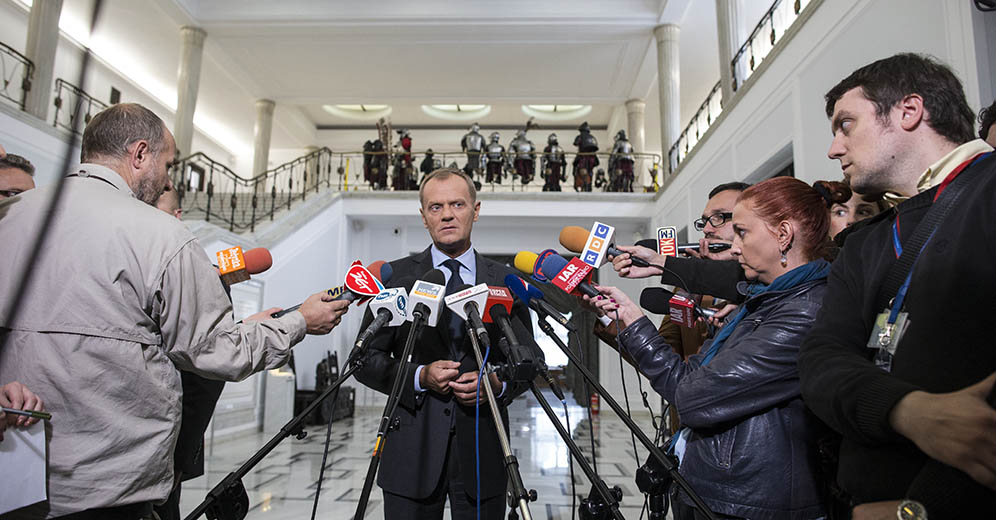The government’s majority in parliament has voted to appoint all members of a controversial commission that will be tasked with investigating Russian influence in Poland.
Most opposition parties boycotted the process. They argue that the commission is intended as a political tool to discredit them amid the campaign for October’s parliamentary elections.
Ahead of yesterday’s vote, the European Commission urged Poland not to form the Russian influence commission before the elections and warned that doing so could prompt further steps in the infringement procedure Brussels launched against Warsaw in June.
❗️Sejm powołał 9 członków Państwowej Komisji ds. badania wpływów rosyjskich na bezpieczeństwo wewnętrzne Polski🇵🇱 w latach 2007‑2022.
👉W skład organu weszli: Józef Brynkus, Sławomir Cenckiewicz, Łukasz Cięgotura, Andrzej Zybertowicz, Przemysław Żurawski vel Grajewski, Michał… pic.twitter.com/OUlv8WjKqS
— Sejm RP🇵🇱 (@KancelariaSejmu) August 30, 2023
Under the law creating the commission, the ruling national-conservative Law and Justice (PiS) was supposed to fill only five of its nine seats. However, because of the opposition boycott, it was in fact able to appoint its candidates to all nine positions.
The far-right Confederation (Konfederacja) party voted against all of PiS’s proposed candidates, but all centrist and left-wing opposition parties did not participate in the vote at all.
Among the figures elected to the council was Sławomir Cenckiewicz, a historian known in particular for researching the communist secret services.
He was also the co-creator of a recent television series on Russian influence aired by state broadcaster TVP, which is a government mouthpiece. The series was seen by many as a way to attack opposition leader Donald Tusk over his relations with Russia when serving as prime minister.
Cios to przesada. Z szacunku dla prac, drogi i wiedzy obu naszych rozmówców o kulisach tych wpisów nie napiszę ani słowa. Za wywiady, gościnę, rozmowy, korespondencję i ważne słowa – wdzięczność. @michalrachon https://t.co/w9stsNeJt5
— Sławomir Cenckiewicz (@Cenckiewicz) June 13, 2023
Other members of the commission include Andrzej Zybertowicz and Przemysław Żurawski vel Grajewski, who are both advisors to President Andrzej Duda, a PiS ally.
Although the opposition did not vote, its representatives criticised the commission in parliamentary speeches, accusing the ruling party of trying to influence the upcoming election using “illegal” methods.
“You want to fight Putin’s influence with Putinist methods,” said Borys Budka, head of the parliamentary caucus of Civic Coalition (KO), the largest opposition party, reports broadcaster TVN24.
In a separate statement, Budka called the candidates put forward by the PiS people with “dubious resumes, dubious qualifications, who have one thing in common, working for Law and Justice propaganda”.
💬 @bbudka w #Sejm o komisji lex Tusk👇
Ta komisja jest nielegalna👇 pic.twitter.com/8pCVF5XOic
— PlatformaObywatelska (@Platforma_org) August 30, 2023
Meanwhile, Krzysztof Gawkowski, head of the parliamentary caucus of the second-largest opposition group, The Left (Lewica), said that the opposition would not have anything against the commission if PiS “really wanted to investigate Russian influence in Poland”.
“But you have put forward candidates to go after the opposition and add to your election campaign,” he said.
Government spokesman Piotr Müller, however, rejected these allegations, saying that it is a “myth” that the commission is being created for the election campaign. It “will not complete its work before the elections”, he noted, and instead will spend “many months, maybe years” investigating Russian influence.
According to PiS’s earlier declarations, the commission was due to present a report on its activities on 17 September. Elections are scheduled for 15 October.
The ruling party has pushed through changes to the commission investigating Russian influence.
It did so despite a @CoE expert report this week recommending the commission be scrapped entirely as it is "fundamentally flawed" and a threat to elections https://t.co/GqNgbgnh48
— Notes from Poland 🇵🇱 (@notesfrompoland) July 28, 2023
A day before the vote to appoint the commission’s members, a European Commission spokesman, Christan Wigand, warned Poland against taking these steps in the context of the upcoming elections.
“[Justice] Commissioner [Didier] Reynders made it clear that…the law raises serious concerns in the light of its compliance with EU law,” he said, quoted by news website Onet.
“For this reason, we urge the Polish authorities not to take such steps in the context of the elections,” added Wigand, warning that the European Commission “will not hesitate to” move forward with infringement proceedings.
The EU has opened legal action against Poland over its new Russian influence commission, which can ban individuals from public office.
This is an "absurd attack" and "interference in Poland's internal affairs", says a deputy leader of the ruling PiS party https://t.co/zsRYpSI1oK
— Notes from Poland 🇵🇱 (@notesfrompoland) June 8, 2023
After the legislation creating the commission was first signed into law by Duda in May, it immediately drew criticism from Brussels and Washington, in particular over the body’s power to ban individuals from holding public office for up to ten years.
That led Duda to propose changes watering down the commission’s powers just days after signing the bill. Those were approved by parliament last month and signed into law on 31 July. Despite the amendments, Council of Europe experts still warn that the commission threatens the fairness of elections.
The original law passed in May required parliament to nominate members of the commission by 14 June. However, that deadline was ignored by the ruling party while amendments to the legislation were being considered.

Notes from Poland is run by a small editorial team and published by an independent, non-profit foundation that is funded through donations from our readers. We cannot do what we do without your support.
Main image credit: Kancelaria Premiera / flickr.com (under CC BY-NC-ND 2.0)

Alicja Ptak is deputy editor-in-chief of Notes from Poland and a multimedia journalist. She has written for Clean Energy Wire and The Times, and she hosts her own podcast, The Warsaw Wire, on Poland’s economy and energy sector. She previously worked for Reuters.



















